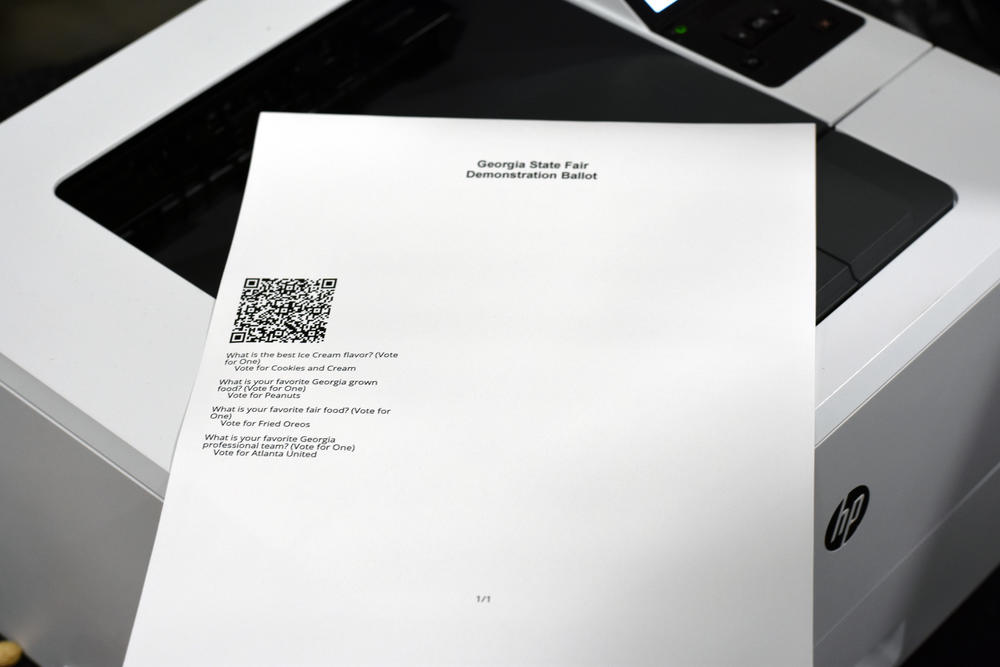Section Branding
Header Content
What’s Going To Happen With Georgia’s May 19 Primary?
Primary Content
As elections officials continue preparations for Georgia’s May 19 primary, the most certain thing about the process is how uncertain things will be.
In Wisconsin Tuesday, a shortage of poll workers led to a closure of polling places in parts of the state, and social distancing stretched out the lines to the polls for blocks as officials tried to keep people safe.
It’s a preview of what is likely to come in Georgia, where (for now) early voting will begin in less than three weeks for the next statewide election, even as top lawmakers call for a postponement until June 16.Morning Edition anchor Leah Fleming talked with GPB’s political reporter Stephen Fowler about what could happen with Georgia's May 19 primary election because of the coronavirus.
Morning Edition anchor Leah Fleming talked with GPB’s political reporter Stephen Fowler about what to expect.
Leah Fleming: First off, where do things stand with Georgia's primary election? I know things are constantly changing, but what is the status right now?
Stephen Fowler: Well, have you seen that meme of Spider-Man pointing at the other Spider-Man? Georgia's election is a lot like that right now, Leah.
The presidential primary has been moved once already for March 24th to May 19th. Now the secretary of state's office said legally, that's the extent of things they can do for now to change the election date, and the legislature could be the ones that could pass a law to move it.
But the legislature is out of session indefinitely because of the coronavirus.
So Republican House Speaker David Ralston says the secretary of state or the governor should change the date.
To add another layer, the governor says he can't change the date, but the secretary of state can!
As we move later on into the month of April and there's more of a longer-term outlook of how long we'll be under a stay-at-home order, and now that the state of public health emergency is extended into May, we'll have a little bit more clarity, I think.
Fleming: Meanwhile, counties have to prepare for voting in a moment like this, and to try to make it as normal as possible.
Now, I know you've been talking with elections officials all across the state, including Veronica Johnson, the supervisor in Lee County in southwest Georgia. Here's a little bit about how she described things right now.
“I'll be honest, it's getting a little scary,” she said. “I've been doing this for 20 years and I can't wrap my head around everything that needs to be done right now.”
So, Stephen, what are you hearing from those who are tasked with running our elections?
Fowler: Honestly, they're working around the clock to try and make things work in this really unprecedented time.
There's a lot of people saying, “wait and see,” and a lot of anticipation and confusion, and like you heard, even fear.
Veronica Johnson, who we just heard from, said it's scary. Her county is in the middle of an especially bad COVID-19 outbreak in southwest Georgia. And she's personally known people that are sick or have died. Her daughter is a nurse at Phoebe Putney Hospital in Albany that's especially being hit hard.
Fleming: So how likely is it that Georgia could have the same problems as Wisconsin did when our elections happen?
Fowler: Well, for the story with the Georgia News Lab that we did last week, we heard from over 80 elections directors of Georgia's 159 counties.
And there concerns largely aligned with what we saw come to light in Wisconsin.
Poll workers, largely older, are not willing to risk their health to work the polls or under doctor's orders, not to work.
Polling places like churches or other private property are not willing to bring in large numbers of outside people that may or may not be infected.
And county officials are trying to figure out how to balance CDC recommendations about how many people can congregate in one area while also keeping lines down and people safe.
Oh – and we can't forget there's a new touchscreen statewide voting system that many haven't used yet.
Most people I talked to begged Georgians to skip voting at the polls and vote absentee if they can.
Fleming: Speaking of absentee ballots, the secretary of state's office is making it a little bit easier to vote by mail for this election. Tell us about that process and how it works.
Fowler: Georgia's 6.9 million active registered voters should be getting an absentee ballot application in the mail.
You fill that out and mail it in, or you can e-mail it to your elections office. There are instructions in the application. And then you will get your ballot in the mail. Once you fill that out and send it back in, boom, you voted from home. You didn't have to go to the polls.
But only 7% or so of Georgians used this method in the 2018 governor's race.
So it'll be a new and unfamiliar process for most people. Take time to look over things, send it in early, just in case there are any issues. And realizing that not everyone is willing to or able to vote by mail, it's important to remind people that local elections officials like we heard from and like we've been talking to are really working to make sure they can accommodate those people who do vote at the polls safely and fairly to make sure that the election – whenever it may happen – will work.



